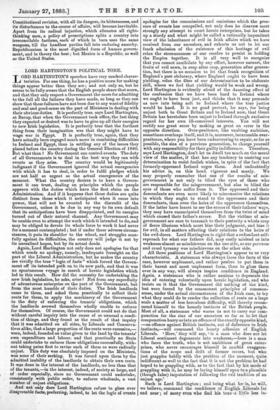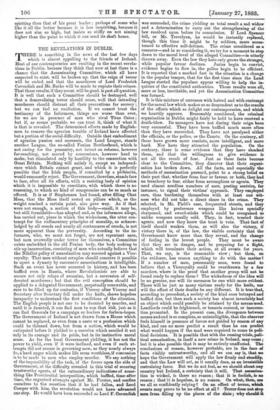LORD HARTINGTON'S POLITICAL TONE.
TORD HARTINGTON'S speeches have very marked charac- I teristics. For one thing, he has a positive scorn for making things appear better than they are ; and not only so, but he seems to be fully aware that the English people share that scorn, and that they only respect a Government the more for admitting to the full all the failures they have made, so long as they can show that these failures have not been due to any want of fidelity and zeal and good-sense on the part of Ministers in dealing with their obvious duties. It is perfectly true, says Lord Hartington, at Bacup, that when the Government took office, the last thing they expected or desired was to have to give up all their energies to new Irish legislation. It is perfectly true that the furthest thing from their imagination was that they might have to wage war in Egypt. It is perfectly true, again, that they have actually been engaged much more in combating difficulties in Ireland and Egypt, than in settling any of the issues they placed before the country during the General Election of 1880. But what then No Government can control events. The duty of all Governments is to deal in the best- way they can with events as they arise. The country would be legitimately indignant if the Government ignored the actual emergencies with which it has to deal, in order to fulfil pledges which are not half so urgent as the actual emergencies of the moment. What the country desires is to have a Govern- ment it can trust, dealing on principles which the people approve with the duties which have the first claim on the Administration. And if it happens that these duties are quite distinct from those which it anticipated when it came into power, that will not be counted to the discredit of the Government, unless it be due in any way to its own default that its anticipations have been disappointed, and its energies turned out of their natural channel. Any Government may be unable even to attempt the work which it intended to do, and may be obliged to devote its whole force to work it had never for a moment contemplated ; but if under these adverse circum- stances, it puts its shoulder to the wheel, and struggles man- fully against its difficulties, the country will judge it not by its unrealised hopes, but by its actual deeds.
Again, Lord Hartington not only does not apologise for that which needs no apology, namely, inadequate foresight on the part of the Liberal Administration, but he makes the country see vividly the true "logic of facts" which forced the Govern- ment off its intended path on to its new path, and that it was no spontaneous voyage in search of heroic legislation which led to this result. How did the necessity for undertaking the new Irish legislation, he asks, arise ? Not from any superfluity of adventurous enterprise on the part of the Government, but from the most humble of their duties. The Irish landlords came to them, and asked them practically to collect their rents for them, to apply the machinery of the Government to the duty of enforcing the tenants' obligations, which the landlords avowed themselves wholly unable to enforce for themselves. Of course, the Government could not do that without careful inquiry into the cause of so unusual a condi- tion of things, and they found as the result of that inquiry that it was admitted on all sides, by Liberals and Conserva- tives alike, that a large proportion of the rents were excessive,— were, indeed, founded on value given to the land by the tenants' own expenditure and labour, and that practically no State could undertake to enforce these obligations successfully, with- out taking pains first to revise such of them as were radically unjust. This duty was absolutely imposed on the Ministers, was none of their seeking. It was forced upon them by the admitted inability of the landlords to obtain their own rents.
It was done in the interest of the landlords, no less than that of the tenants,—in the interest, indeed, of society at large, and of order especially, since no Government could undertake, consistently with public order, to enforce wholesale, a vast number of unjust obligations. And not only does Lord Hartington refuse to gloss over disagreeable facts, preferring, indeed, to let the logic of events apologise for the commissions and omissions which the pres- sure of events has compelled, not only does he disavow most strongly any attempt to court heroic enterprises, but he takes up a sturdy and what might be called a rationally impenitent view of the inheritance of evil in Irish affairs which we have received from our ancestors, and exhorts us not to let our frank admission of the existence of this heritage of evil relax the strenuousness of our resolve to persist in holding the Empire together. It is all very well to recognise that you cannot annihilate by any effort, however earnest, the fruits of evil sown, in crop after crop, generation after genera- tion, but there is no occasion to let that frank recognition of England's past obduracy, where England ought to have been yielding. relax the fibre of our determination to be obdurate still, where we feel that yielding would be weak and wrong. Lord Hartington is evidently afraid of the daunting effect of the confession that we have been hard to Ireland where we ought to have been' just, and thinks that it may persuade us now into being soft to Ireland where the true justice would be hard. It is no good pretext, he says, for being unjust both to Great Britain and to Ireland now, that Great Britain has heretofore been unjust to Ireland through exclusive regard for her own ill-conceived interests. You will not rectify one great error by making as great an error in the opposite direction. Over-penitence, like vaulting ambition, sometimes overleaps itself, and it is, moreover, inexcusable over- penitence where you have been endeavouring to repair, so far as possible, the sins of a previous generation, to charge yourself with any responsibility for their guilty indifference. Therefore, says Lord Hartington, don't let us dwell too much on the moral view of the matter, if that has any tendency to unstring our determination to resist foolish wishes, in spite of the fact that formerly-oppressed Ireland urges them: And undoubtedly his advice is, on this head, vigorous and manly. We may properly remember that one of the results of mis- government is not only to blind the eyes of those who are responsible for the misgovernment, but also to blind the eyes of those who suffer from it. The oppressed and their descendants are even more likely to misconceive the relations in which they ought to stand to the oppressors and their descendants, than even the heirs,of the oppressors themselves. If the latter have learnt to see the errors of their fathers' ways, they may have emancipated themselves from the twist of mind which caused their father's errors. But the victims of mis- government are sure to transmit to their posterity a whole crop of fierce illusions which must bias their Judgment, and bias it for evil, in all matters affecting their relations to the heirs of the evil-doers. Lord Hartington is right that a redundant self- reproach for what our fathers did, may easily mislead us into weakness almost as mischievous on the one side, as our perverse and cruel tyranny was mischievous on the other side.
All three positions of Lord Hartington's appear to us very characteristic. A statesman who always faces the facts of the case, however unpleasant, and rather prefers to put them in their barest and most unpleasant form, than to gloss them over in any way, will always inspire confidence in England. Again, a statesman who is rather anxious to deprecate the idea of entering voluntarily upon heroic legislation, and who insists on it that the Government did nothing of the kind, but were forced by the commonest principles of common- sense, under the actual circumstances of the Irish case, to try what they could do to render the collection of rents on a large scale a matter of less herculean difficulty, will thereby recom- mend himself to the homely instincts of the British people. Most of all, a statesman who warns us not to carry our com, punction for the sins of our ancestors so far as to let that compunction hurry us into an offence of the exactly opposite kind, —an offence against British instincts, out of deference to Irish instincts,—will command the hearty adhesion of English Liberals. 'Here,' they will say, 'is a man who does not let Liberal sentiment degenerate into weakness,—here is a man who faces the truth, who is not ambitious of great enter- prises, who never encourages himself, in morbid exaggera- tions of the scope and drift of former errors, but who just grapples boldly with the problem of the kaoment, quite indifferent as well to the fact that it is not the problem he had hoped to be grappling with, as to the fact that by his mode of grappling with it, he may be laying himself open to a plausible (though false) imputation of following the evil tradition of an unjust age.'
Such is Lord Hartington ; and being what he is, he will, we believe, command the confidence of English Liberals far and near ; of many even who find his tone -a little less in- spiriting than that of his great leader ; perhaps of some who like it all the better because it is less inspiriting, because it does not aim so high, but insists so stiffly on not aiming higher than the point to which it can send its shaft home.







































 Previous page
Previous page